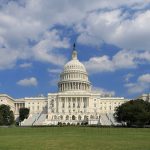Wisconsin Researchers Sound Alarm Over DEI-Related Research Cuts
40 Wisconsin grants have been terminated after US Supreme Court's NIH ruling.

Joseph J. Zilber School of Public Health at the University of Wisconsin-Milwaukee. Photo by Jeramey Jannene.
For the last few weeks, Karyn Frick, a neuroscientist at the University of Wisconsin-Milwaukee, had been scrambling to rebuild a student research program that she thought had been killed.
The program, aimed at involving more undergraduate students in research on aging, relied on a five-year, $2 million grant from the National Institutes of Health, the nation’s largest public funder of biomedical research.
In the earliest days of President Donald Trump’s second term, that federal agency began terminating research grants deemed counter to “agency priorities,” including those flagged for supporting research into gender, sexuality and diversity. That eventually included Frick’s grant, which had originally been aimed at students from underrepresented backgrounds.
“We had all sort of made peace with the fact that it was terminated,” Frick said.
Then, some unexpected good news arrived later in the summer: the funding had been reinstated, likely a response to a lower court ruling that freezing the grants counted as governmental discrimination.
“So we’ve been spending a lot of time trying to reconstitute the program, reach out to the students, make sure they’re still interested in participating, make sure the mentors are still willing to mentor them,” Frick said.
But last week, a decision out of the U.S. Supreme Court dashed those hopes for good, as the high court ruled that the NIH could indeed move forward with canceling those grants.
A week before students return to campus, Frick said she has to call the students back “and tell them, ‘Oh, sorry, this is actually now not happening.’”
And Frick argues that will have wide-ranging effects, not just on these students and their lab work, but on medical and scientific research in Wisconsin and beyond.
The court ruling on Thursday spells the end of thousands of research grants worth at least three-quarters of a billion dollars, but perhaps totaling as much as $2 billion, according to the journal Nature.
It comes after months of litigation from both scientists and state attorneys general, including Wisconsin’s AG Josh Kaul. The lawsuit against the government argued that the grants were canceled too abruptly and in a way that was beyond the authority of the executive branch. The federal government has called the terminated grants discriminatory.
NIH grants supported research across Wisconsin
According to data collected by Grant Witness, which tracks canceled and suspended federal research grants, at least 40 of those are at research institutions in Wisconsin, including campuses of the Universities of Wisconsin and the Medical College of Wisconsin.
In a statement, a spokesperson for UW-Madison said the university “does not yet have clarity on the full impacts of” the ruling, but that it “puts at risk” more than $14 million for biomedical research.
“This figure represents the remaining money on 22 grants that were already approved and underway, which also means the time and money already spent on these projects will potentially go to waste, in addition to the money that will not be recovered,” said UW-Madison spokesperson Victoria Comella.
The grant program that Frick oversaw helped pay UW-Milwaukee students from a range of majors, like nursing, public health and engineering, to study changes to memory and grip strength and research care models in nursing homes.
With its cancelation, Frick said, students will have to scramble to reorient their schedules or find alternate jobs now that their promised research positions are gone. Longer term, she said, it could narrow the pipeline of who can build a career in scientific research.
Thousands of grants were also cut at private universities like Harvard, Columbia and Northwestern. But Frick said the loss of the grant at a small public university like UW-Milwaukee has a larger ripple effect.
“Compared to a larger research university, there are fewer of us who are bringing in NIH funds. And so, if faculty are losing those grants, it really has a bigger impact at UWM because there are fewer of those grants,” she said.
Ironically, the part of the grant that put it on the chopping block — prioritizing students from underprivileged backgrounds, such as students of color, low-income students and first-generation college students — was no longer in play when the NIH directive targeting DEI initiatives went into effect.
The lab restructured the program to involve students of any background after the U.S. Supreme Court struck down the use of race-based admission factors at universities in 2023, Frick said. Instead, the grant was expanded to include any student interested in researching the effects of aging.
“There shouldn’t be anything particularly political about aging. We all get old, and aging is a tough process. It affects people in a variety of different ways. And we should all be supportive of trying to understand how aging affects our bodies and our lives,” she said.
“Undergraduates could have contributed to that, and it may have sparked an interest in aging that they would go on to contribute to the field in whatever way, whether that’s research, whether that’s going into nursing or medicine,” Frick added. “That’s not going to happen if a training program like this goes away.”
A divided decision from a divided Supreme Court
Thursday’s decision came almost six months after the journal Nature first reported that the NIH was reviewing active projects for ties to diversity, equity and inclusion practices. Depending on the findings of that review, projects were required to be restructured, or some saw their funding stripped altogether.
That review flagged projects that focused on LGBTQ+ people or communities, or examined health disparities in different ethnic communities, for example. It also looked for projects that supported research in China or that studied HIV and COVID-19.
In arguments before the U.S. Supreme Court, the Trump administration argued that this approach to research amounted to discrimination.
Scientists who filed suit against the government, alongside state attorneys general, including Wisconsin’s, argued that the grants were canceled too abruptly and in a way that was beyond the authority of the executive branch.
In June, a lower court ruled that it was the federal guidance cutting the grants — not the grant-supported research — that constituted discrimination. That ruling temporarily released the frozen and terminated funds.
But on Thursday, the Supreme Court ruled that the researchers should have filed their lawsuit in contract court, and that future challenges to withheld grant money should be treated as contract violations.
Critics of the ruling, such as Massachusetts Attorney General Andrea Joy Campbell, argue justices had put institutions in the losing position of having to litigate each individual grant they wish to restore.
“They ordered the recipients of that funding — hospitals, researchers, and the state — to jump through more hoops to get it back,” Campbell said in a statement.
Frick, the neuroscientist and UW-Milwaukee researcher, said the rapid changes out of federal offices that scientists have relied on for decades makes the research process more complicated.
“When so much is uncertain at the NIH these days, it’s hard to know what is fundable, because … what we understood as the way that decisions were made about grants by scientists and leaders who were based in science, that doesn’t seem to be the case anymore,” she said.
The DEI-related cuts are separate from other changes to NIH funding under the Trump administration. That includes a 15 percent funding cap on indirect research costs, which was imposed in February. Wisconsin was one of several states to join a lawsuit against that cap, which was temporarily paused in April. An appeal is pending.
Wisconsin researchers sound alarm after US Supreme Court upholds DEI-related research cuts was originally published by Wisconsin Public Radio.
If you think stories like this are important, become a member of Urban Milwaukee and help support real, independent journalism. Plus you get some cool added benefits.


















